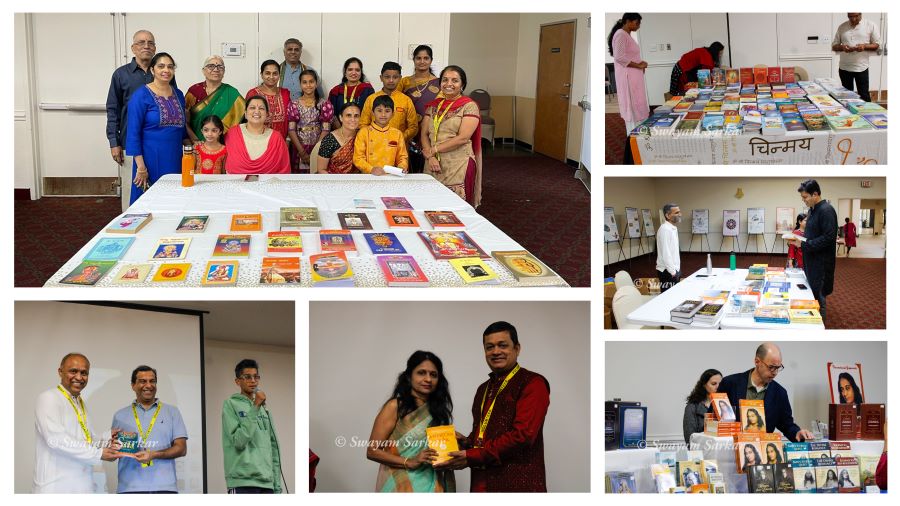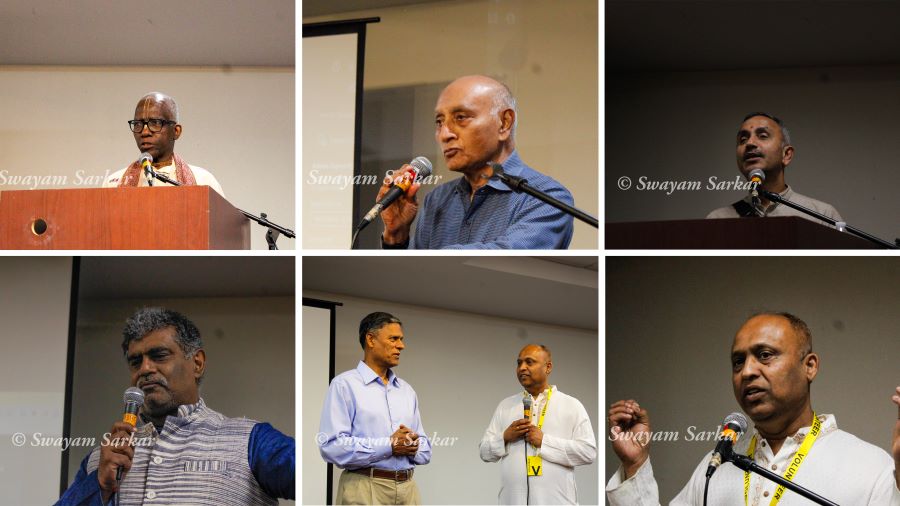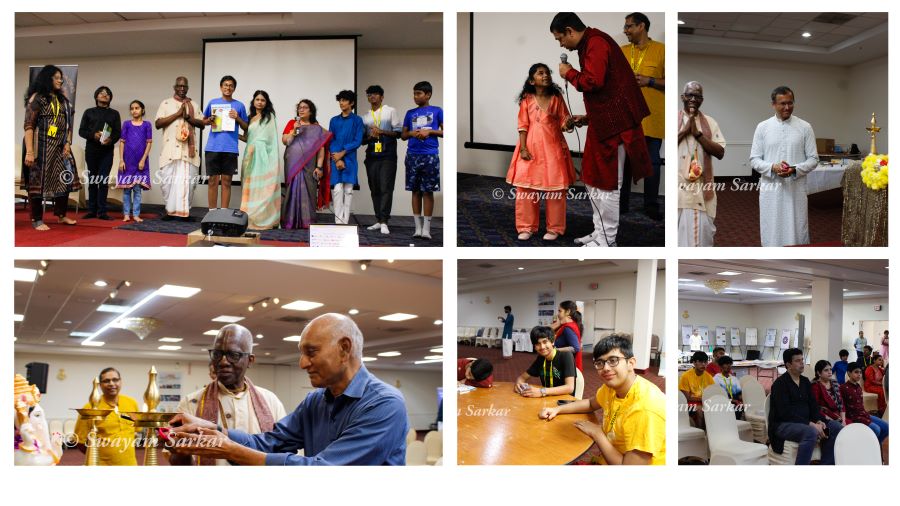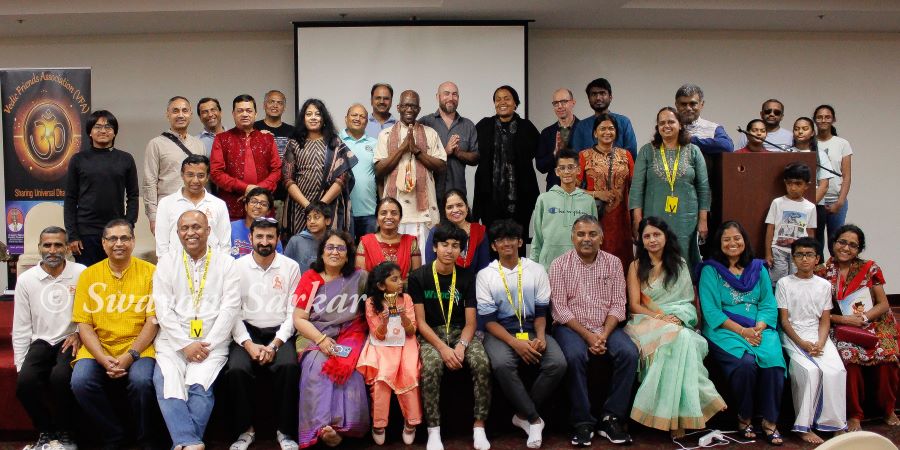BY JYOTHSNA HEGDE
Atlanta, GA, November 2, 2023: “Whenever I have read any part of the Vedas, I have felt that some unearthly and unknown light illuminated me. In the great teaching of the Vedas, there is no touch of sectarianism. It is of all ages, climes, and nationalities and is the royal road for the attainment of the Great Knowledge. When I read it, I feel that I am under the spangled heavens of a summer night,” Henry David Thoreau, American naturalist, essayist, poet, and philosopher said about the Vedas.
Showcasing Vedas and the expansive knowledge it beholds, Vedic Friends Association (VFA) hosted Vedic Hindu Book fair featuring books with roots in the Vedas and ancient Hindu scriptures, along with several activities comprising of addresses by speakers, writing, quiz, and speaking competitions. Several organizations across Atlanta including Sewa International, Heartfulness, Self-Realization Fellowship, Chinmaya Mission. Ananthaadi Rayara Matha (RAMA), Gaudiya Vaishnava Association, HSS, Lakshmi Narasimha Cultural Center, Ekal, SMAP, CoHNA, UPNAA, Soorya Foundation and Dharmansh joined the fair.

The book fair was held on two separate weekends at two different locations. The first fair was held on September 23 at Fowler Park in Cumming and the next, on Oct 1 at the Global Mall in Norcross.
“One of the main purposes of the fair was to present Vedic secrets for modern living, to explore, learn and transform,” Vijai Gana, co-founder, Treasurer, VFA said.
Jeffrey Armstrong’s Gita comes Alive, Kamlesh Patel’s Spiritual Anatomy, Michael Cremo’s Human Devolution, Subhash Kak’s An Idea of India, Ram Madhav book’s Hindutva Paradigm, David Frawley’s Gods, Sages and Kings, Stephen Knapp’s Crimes against India and Phil Goldberg’s American Veda were few of the popular books featured at the fair.

VFA, a non-profit Organization with 501c3 tax-exempt status, is a cultural organization based on Socio-Spiritual-Scientific understanding. Headquartered in Atlanta, it was founded by Stephen Knapp, David Frawley and Beth Kulkarni in the year 2002, in Detroit, Michigan.
“The vision of VFA, is to make this an annual event, and to encourage other Dharmic organizations, to participate and share their valuable literatures,” Balabhadra Dasa (Benny Tillman), President of Vedic Friends Association (VFA), said.
VFA is an international body of people who have embraced Vedic culture or deeply respect the Vedic vision and way of life, including its systems of yoga, meditation, pranayama, languages and literature, and the like.
The Global Mall event opened with a Talk on Social Responsibility and Sewa by Madhav Durbha and competition followed by a traditional Inauguration of lighting of Diya by Madhav Durbha and Shloka recital by students of RAMA. The event also featured talks from Benny Tillman, Dr Ketan from Dharmansh, Nilesh Oak, preview of “Spiritual Anatomy” authored by Padma Bhushan awardee Kamlesh Patel, Heartfulness, this author, and Desh Kapoor of Dristikone.
The schedule was packed with competitions, announcements with this author also serving as a judge for their writing and speaking competitions.
“It was a unique experience to see different Hindu organizations participating under one roof. Thanks to Sri. Vijai for RAMA to be part of this event. Students of Gurukula enjoyed reciting Stotras and taking part in various quizzes and competitions. We thank RAMA volunteers for preparing sumptuous meals for all at the event,” Pradeep Vittalamurthy, Founder RAMA, said.

“The Vedic Book Fair has exceeded our expectations in terms of attendance and engagement. It is heartening to witness so many individuals coming together to celebrate and learn from our rich Vedic heritage. We look forward to continuing our efforts in promoting Vedic knowledge and culture Under the capable and visionary leadership of President Balabhadra Prabju ji, the Vedic Friends Association executed a flawless event that catered to the needs and interests of attendees, both novices and experts in the Vedic knowledge domain. Many volunteers’ dedication and tireless efforts played a pivotal role in making this event an immense success,” Prakash Srivastava, Global IT Director, VFA, said.
“The first-ever Hindu/Vedic Book Fair, organized by the Vedic Friends Association, was a truly inspiring event. As the president of the Vedic Friends Association (VFA), I am honored to express my appreciation for the volunteers, and the numerous organizations that participated,” Tillman said.
“The Vedas play a key role in preserving and defining the cultural identity of Hinduism and its followers, both in India and across the world. They are invaluable from a linguistic and historical perspective, as they provide insights into the ancient Sanskrit language and the social and cultural contexts of their time. While the Vedas may not directly dictate modern societal norms, their enduring influence on culture, spirituality, and philosophy makes them relevant and significant in the contemporary world,” Gana noted.
Brief overview of Vedas
Sanskrit literature can be classified under six orthodox heads and four secular heads. The six scriptures include Srutis, Smritis, Itihasas, Puranas, Agamas and Darsanas. The four secular writings include Subhashitas, Kavyas, Natakas and Alankaras.
The Srutis are called the Vedas, or the Amnaya. The term Veda originates from ‘Vid‘, to know. The word Veda means knowledge. When it is applied to scripture, it signifies a book of knowledge. There are four distinctive parts of the Vedas, which are arranged chronologically: The Samhitas – the oldest known part of the Vedas, primarily constituted of hymns and prayers in praise of God, The Brahmanas – a handbook of rituals and prayers to guide priests in their rituals, The Aranyakas – concerned with worship and meditation, and The Upanishads – mystical and philosophical teachings.
The Samhita part of the Vedas can be divided into four distinct types, namely: Rigveda, Samaveda, Yajurveda and Atharvaveda. Rigveda. This is the oldest form of Veda. Rigveda consists of 1028 hymns, which are also called ‘suktas’ and is a collection of 10 books called ‘Mandalas’. Samaveda is essentially concerned with public worship. It has a total of 1549 verses out of which 75 of them have been taken from the Rigveda ‘Sama’ which translates to melody, is not meant to be read as a text, rather a musical score sheet that must be heard. There are two types of Yajurveda- the Krishna (Black/Dark) and the Shukla (White/Bright). Krishna Yajurveda pertains to a more obfuscated and obscure motley collection of verses, as opposed to Shukla Yajurveda, where verses are clear and arranged. The oldest version of this Veda has 1875 verses, mostly adopted from the Rigveda. The Atharvaveda constitutes the daily procedures or codes of conduct of life and its various chores. It primarily has 730 hymns / suktas, 6000 mantras, and 20 books. It is a multifaceted text that encompasses a wide range of topics, from magic and medicine to philosophy and ethics. It serves as a window into the beliefs, practices, and social dynamics of early Vedic society.
“About Indian philosophy, some of the ideas of quantum physics that seemed so crazy suddenly became more meaningful,” German physicist Werner Heisenberg said. The concepts of atoms, molecules and substances can be traced back to the Vedic age. The concepts of astronomy, metaphysics and spirituality are described in the Rig Veda.
From the intricate layout of the Harappan cities to the existence of the iron pillars in Delhi, the indigenous technology in ancient India is evidently extremely sophisticated. Take the science behind temples, for example. Temple spots are carefully chosen where magnetic and electric waves are abundant. The main idol is placed in the center, where the magnetic waves are highly active. During the installation of the idol, some copper plates are buried under the statue; The plates are engraved with the Vedic script; These copper plates absorb magnetic waves from the earth and radiate to the surrounding area. When a person regularly visits the temple and moves around the idol clockwise, his body absorbs these magnetic waves and increases the positive energy to live a healthy life.





